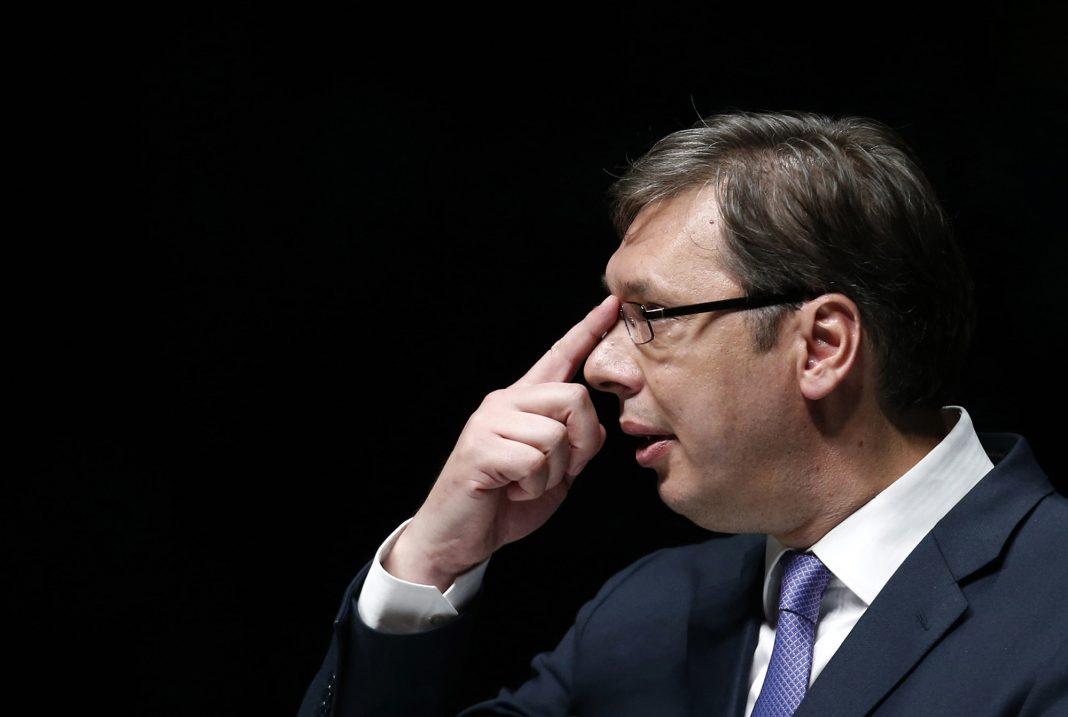It is no secret that Serbia is often called a chameleon country because its leaders often lean to one side or the other. In many respects, it depends on the political conjuncture and interest. A recent example is the recent statement by Serbian Deputy Prime Minister Aleksandar Vulin that joining BRICS would be a real alternative for Belgrade to joining the European Union. And all that would be nothing, but the fact is that back in April this year, Serbian President Aleksandar Vucic said that his country continues its path to the European Union (EU) and rejected the information that he dreams of Serbia joining BRICS.
At the time, journalists asked Vucic to comment on the statement by American Enterprise Institute expert Ivana Stradner that the Serbian president “dreams of abandoning the path to the European Union for BRICS membership.” Aleksandar Vucic said such commentators are “abnormal” and “they should all be treated.” “How does she know what I’m thinking. Have they inserted some kind of chip in me and now they are busy reading my thoughts, what I dream about and what I dream about? Have they gone crazy all together…? I exceptionally respect BRICS, but Serbia is on the European path, and Serbia will stay on it. Contrary to all attempts by some who say they are in favor of Serbia on the European path to push Serbia off that path. We will stay on the European path, on purpose to make them nervous,” he assured.
To use chess terminology, Belgrade is playing on four geopolitical boards at once, playing its own game with each of the actors of big politics. By simultaneously wooing the Chinese, the Americans, the Russians and the European Union, it has managed to convince them all that it is on their side. It’s just a matter of getting what’s due.
In this article Ascolta analyzes the main trends and sentiments in Serbian foreign policy, which is accidentally or deliberately “lost” in the labyrinth of the United States, the EU, China and Russia. The piece also attempts to identify the highest-priority geopolitical direction that Belgrade will follow.
This Content Is Only For Subscribers
Vucic wants to go to the EU
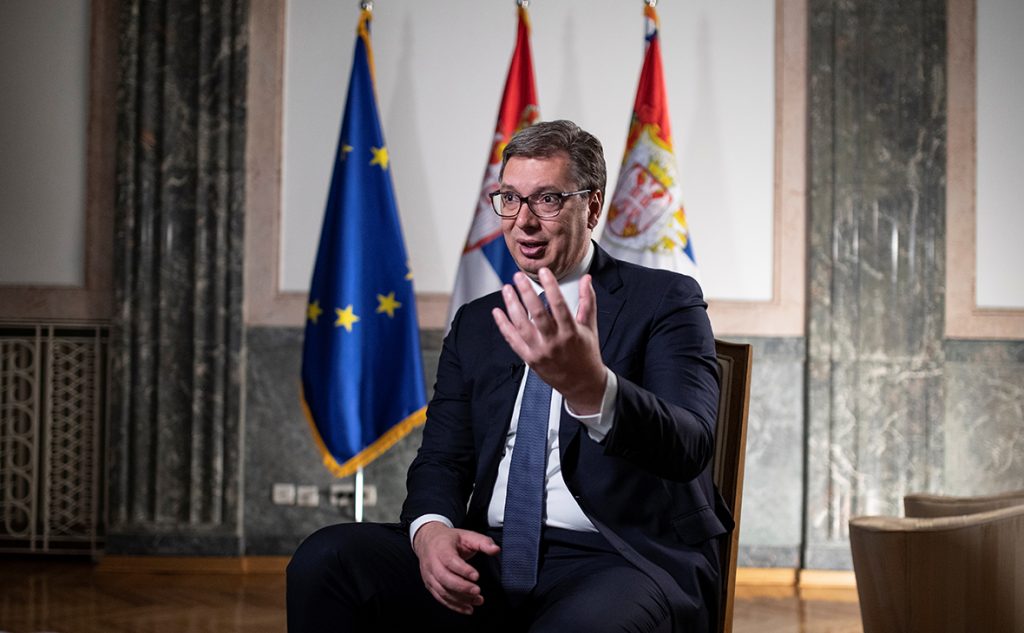
Analyzing Belgrade’s foreign policy, it becomes not quite clear where President Vucic wants Serbia to be. He takes investments and favorable trade terms from China. He knows that Russia has been emotionally attached to Serbian public opinion for centuries and refuses to sign international sanctions against Putin’s government. And while Beijing and Moscow do not lecture Vucic on free speech and political pluralism, he says he wants Serbia to join the EU and is not going to sit on “two stools.”
Belgrade’s “romance” with the European Union began in 2009, when Serbia applied for EU membership and three years later was granted candidate status. However, in 2021, Vucic said that the country was becoming less and less interested in joining the European Union because the process was dragging on and its citizens were not seeing progress. And here Vucic is quite right: the EU enlargement process has largely stalled and the fault lies more in Brussels’ lack of appetite for new members. In Vucic’s unoptimistic view, his country’s accession to the European Union will not happen before 2030, and the EU should accept Belgrade’s different views on certain issues.
However, if we hypothetically imagine that Serbia joins the EU according to the current integration model, then it gets the right to veto any key European decisions, its own commissioner, a share in the European Parliament and much more. And nobody in the EU needs this – they have enough for Orban, the leader of Hungary. Therefore, it is very likely that there will be no Serbia’s accession to the EU until there is a reform of the mechanism of decision-making in the European Union, voting by majority vote. And this will take quite a long time.
Another issue hampering Serbia’s integration into the EU, according to the Serbian president, is relations with the partially recognized republic of Kosovo. “We cannot become part of the EU until we solve the issue of relations with Pristina, and this is clear to everyone, and there is no need to deceive ourselves,” Vucic said. In the EU’s understanding, the solution to the “Kosovo issue” is the recognition of Kosovo’s independence. And Serbs do not want to do that. Especially since within the EU it has not been recognized by Spain, Greece, Cyprus, Slovakia and Romania. And of the 46 member countries of the Council of Europe, 12 do not recognize Kosovo.
In Serbia itself, the overwhelming majority – more than 90% of the population – is against recognizing Kosovo’s independence in its current form. Therefore, no country’s leader in his right mind would go for it. Moreover, most Serbs are not ready to trade EU membership for Kosovo’s recognition. So demanding that Serbia recognize Kosovo’s independence would be a national humiliation for most Serbs and would forever turn Belgrade away from EU integration. And this is a huge problem, given the current rules of the EU, which does not want to accept new members with unresolved territorial and sovereignty issues.
Another obstacle to Serbia’s future EU membership is its reluctance to harmonize its policies with the EU’s Common Foreign and Security Policy (CFSP). Belgrade’s relations with Moscow remain a stumbling block on this path. For example, Serbia refused to join Western sanctions against Russia after its invasion of Ukraine. And the main reason why the U.S. and EU are looking past Belgrade’s non-adherence to sanctions is its munitions exports to Ukraine. But the pressure on Serbia intensified after Serbian Deputy Prime Minister Aleksandar Vulin met with Russian President Vladimir Putin in September this year, on the margins of an economic forum in Vladivostok, where Vulin called Serbia “Russia’s ally.”
“Maintaining or even strengthening ties with Russia during its illegal aggression against the Ukrainian people is incompatible with EU values and incompatible with the EU accession process,” EU foreign affairs spokesman Peter Stano said. “We therefore expect Serbia to refrain from intensifying ties and contacts with Russia,” he told a news conference in Brussels. Concern over the meeting was also expressed in Washington. “The US position on Aleksandar Vulin is well known” and he remains under US sanctions, the State Department recalled in connection with the meeting between the Serbian deputy prime minister and Putin.
“Our focus remains on working with Serbia’s leaders to strengthen the strategic partnership between our countries,” the U.S. Foreign Service emphasizes.
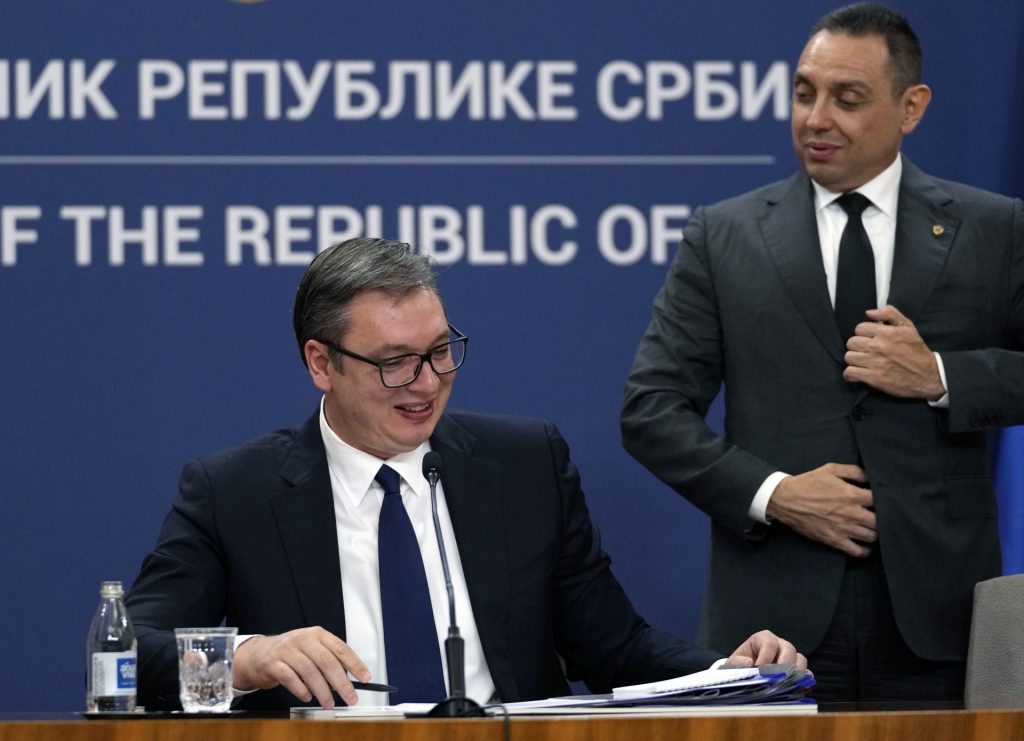
However, the EU is concerned not only about Belgrade’s interaction with Russia, but also with China. Relations with Beijing, according to EU officials, also do not bring Serbia closer to the European Union. Therefore, Brussels has made a “horse’s play”, which, on the one hand, may become Serbia’s pass to the EU, while on the other hand, will “cool down” the Serbian-Chinese relations and help Europe to reduce its dependence on Beijing. It is about the so-called lithium deal. The fact is that currently 97% of the lithium used by the European Union comes from China. “What we’ve seen over the last 20 to 30 years is that China has been strategically buying up mine after mine around the world. They take the raw materials, process them in China and then they get a monopoly on those raw materials, so we are totally dependent on China,” Ursula von der Leyen said during her opening speech at the Clean Technology Industry Dialogue in Brussels.
By the way, Serbian President Aleksandar Vucic said earlier that Chinese automakers had expressed interest in buying Serbian lithium, but Serbia wants to strengthen ties with the EU and provide lithium to Europe. Vucic pledged not to sell lithium to China, promising to favor German car companies such as Mercedes-Benz, Volkswagen and the Dutch Stellantis. German Chancellor Olaf Scholz attended the signing and welcomed the agreement, saying it would help Europe maintain its independence and present opportunities for increased production of batteries and electric vehicles.
It is worth recalling that in early July this year, Serbia’s constitutional court overturned the decision to stop a $2.4 billion mining project in the west of the country in the Jadar Valley, where the largest lithium deposit in Europe is located, and gave the green light to the Anglo-Australian mining corporation Rio Tinto to resume lithium mining. It is expected that the development of deposits in northwestern Serbia will be able to cover 17% of demand in the European Union. This amount of lithium will be enough to produce 1.1 million electric cars per year. In addition, the project will bring 6 billion euros in new investments and will play a key role in Serbia’s integration into the European and global markets.
The problem with the mine arose in 2021, when plans to develop the mine in Jadar triggered major environmental protests in Belgrade. In this regard, Scholz emphasized the importance of environmental concerns, assuring that Germany will closely monitor the development of the yet-to-be-built mine and promised to “provide environmentally acceptable solutions and the knowledge of German mining engineers every step of the way.” In addition, according to the details of the agreement signed with the EU, the president will personally oversee the development of the project, and “meet on a regular basis with European Commission Vice President Šefčovič to monitor progress and decide on next steps.
Following the agreement, the Frankfurter Allgemeine Zeitung wrote at the time: “First, Europe can reduce its dependence on Chinese battery production. Second, closer economic relations could lead Serbia to loosen its ties with Moscow and Beijing. Third, Vucic thus has more incentive not to play a destructive role in the conflict with Kosovo….. German and European foreign policy is often accused of lacking strategy and of not fully representing its own interests. With his visit to Belgrade, Scholz demonstrated that it is possible to do things differently.
But Olaf Scholz was not the only one who demonstrated his ability to stand up for his own interests and behave differently. Emmanuel Macron should also be mentioned in this regard. If before Russia’s full-scale aggression against Ukraine, Serbian President Vucic boasted about the number of personal meetings with Russian leader Vladimir Putin, now he is publicly proud of his friendship with French President Emmanuel Macron and emphasizes the readiness of the French leader to always listen to the Serbian president about his country’s problems. And it is worth noting that Macron is acting very competently, promoting the interests, first of all, of France.
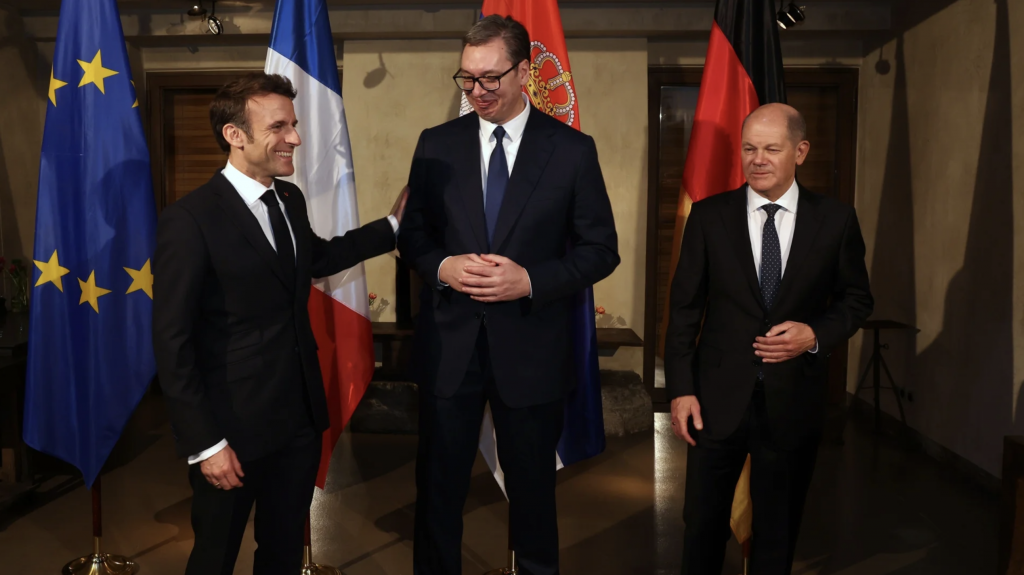
During his visit to Belgrade, French President Macron ignored all concerns about Serbia’s ties with Russia for the sake of favorable deals on fighter jets and nuclear energy. In addition, there were no harsh remarks from the French president about problems with the rule of law, freedom of speech, or progress in normalizing relations between Belgrade and Kosovo. But 12 agreements were signed, three of which have far-reaching implications. The first of the three documents provides for Belgrade’s purchase of 12 French Rafale fighter jets worth 2.7 billion euros. These airplanes are to replace the outdated Russian MIGs. Of course, this agreement did not please Moscow, because the purchase of French airplanes deepens the military-technical cooperation of Serbia with the EU countries. This means that the Serbian market of military equipment, where China is also present, is narrowing for Russia.
The second is a memorandum on cooperation in the field of nuclear energy. The document concretizes the cooperation agreement signed during Vucic’s May visit to France with the French energy state company. It is about the construction of a French-designed nuclear power plant, using the latest technologies and European equipment. The third is an agreement on the supply of strategic metals and minerals, research and development of critical and strategic minerals. This document should be seen as a continuation of the efforts of the FRG and the EU to mine much-needed lithium for European industry in northwestern Serbia. “The agreements signed are historic,” Macron said. “I see that many people are offended that Serbia has relations with Russia and China … but I respect Serbia’s sovereignty.”
It is worth noting that relations between France and Serbia do have a special character. Today, more than 80 percent of French investments in the Balkans are in Serbia, and more than 100 French companies in Serbia employ about 12,000 people.
Serbia has counted on France’s support whenever it has been backed into a corner by other European countries. In May of this year, the Parliamentary Assembly of the Council of Europe voted for Kosovo to become a member of the human rights organization. But France was among the countries that blocked the Council of Europe’s final vote, citing Pristina’s insufficient efforts to establish the Association of Serb Municipalities, a political body meant to represent Kosovo’s Serb minority. And it should be noted that both Serbia and France stand to benefit significantly from the renewed union.
French interests are primarily economic and financial in nature, while President Vucic’s interest is to regain Western cover and support for his own policies. Undoubtedly, the visits of Macron and Scholz are important for EU integration, but in general neither Washington nor Brussels have ever gotten closer to Belgrade. Perhaps because their main goal is simply to prevent Serbia from becoming a Russian satellite, like Belarus. And this is a very low bar for people who want more. Countries like Serbia or, for example, Moldova, which are in between the big players, have to cope with the realities, acting with an eye not only on Washington and Brussels, but also on Moscow and Beijing.
Hope for Trump
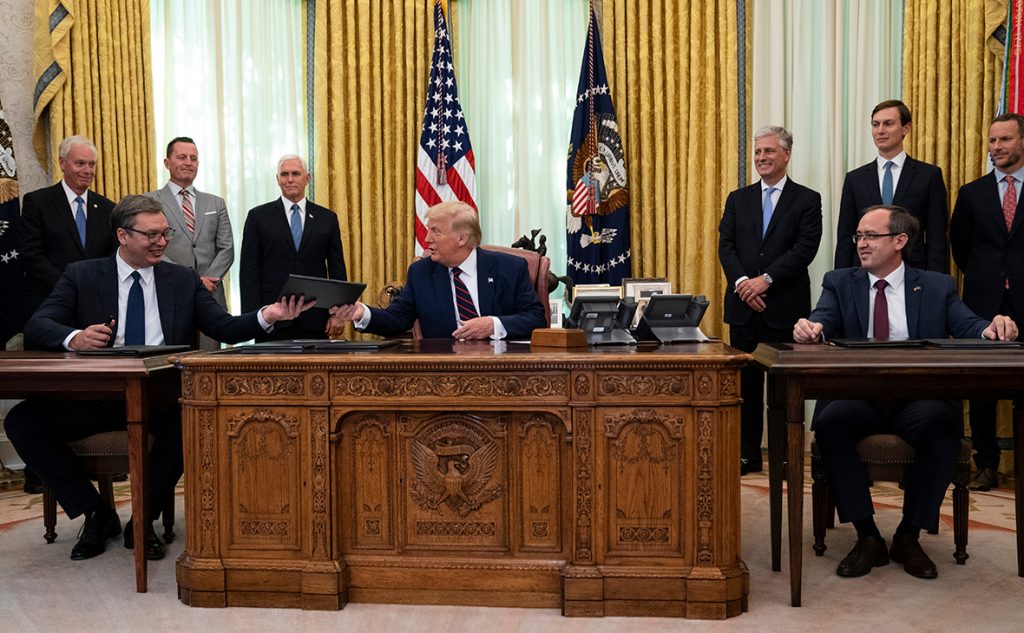
Serbia’s foreign policy has always been four-pronged – reliance on four centers of power: the EU, Russia, the US and China. In this approach, two centers have usually always stood out from the rest. In the past, it was the EU and Russia. Now, to a greater extent, it is the U.S. and China. Russia’s full-scale aggression against Ukraine has marked an important foreign policy trend in Serbia – rapprochement with the US. Over the past two years, the U.S. has become Serbia’s main partner in defense and security issues. And this is despite the fact that anti-American sentiments are strong in the country, and for many Serbs the U.S. remains an enemy not only because of the bombings of the 1990s, but also because Washington recognized Kosovo’s independence in 2008. However, the elite has always been well aware that relations with the U.S. are largely tied to the issues of Kosovo, Bosnia and Herzegovina, and will not be resolved without establishing healthy relations with Washington.
The U.S. also realizes that Serbia must be negotiated with – after all, it is the most important country in the Balkans, and until they settle the disputes, full American control of the region can be forgotten. Washington has begun to “woo” Vucic. President Joe Biden chose respected old Balkan specialist Chris Hill as ambassador to Belgrade to find ways to communicate with the Serbian government. The truth appears to be that Vucic is likelier to favor Donald Trump. The Serbian leadership is very hopeful that Trump will return to the White House after the U.S. presidential election on November 5. On the whole, however, the Republicans are seen by the Serbs as less toxic. It was not in their cadence to bomb Serbia in the 1990s and recognize Kosovo’s independence. Trump has always seemed to the Serbian authorities a much more convenient political figure than any of the Democrats.
However, the cunning Vucic does not talk about it out loud. Asked how Trump’s second term might affect Serbia, Vucic dodges the question: “I am not a big leader like many other European leaders who take sides. My friend Viktor Orban is 100% on Trump’s side. My friends from Brussels are 100 percent on Biden’s side. I am not. I am on Serbia’s side and I am waiting for the results,” he said.
Nevertheless, as the Financial Times article notes, Vucic’s team is trying to build a close relationship with Trump’s team. The article notes that in the center of the Serbian capital Belgrade they plan to demolish the building of the former Ministry of Defense of Yugoslavia and build a hotel and residential complex there. Investors will be businesses from the United States. Behind the deal is former Donald Trump administration aide Richard Grenell. According to analysts, the deal is an example of how a small non-aligned state can prepare for Trump’s possible return to the White House. Serbian President Aleksandar Vucic insists the agreement is purely a business project and denies the idea of a quid pro quo.
However, the authors say the agreement looks overtly political because the counterparty is the Serbian state. It provides Vucic with close ties to the White House in case Trump wins the election in November. In addition, Grenell is named as a potential secretary of state if the former president is re-elected for a second term. Serbian authorities are somehow confident that they can get much more benefit from Trump than from Biden. Although, if you look at U.S.-Serbian relations over the past two years, things with Biden have not been going so badly. For example, Washington sided with Belgrade after the Kosovars shut down local Serbian government offices. The U.S. Embassy in Kosovo reiterated in a statement “Washington’s concern and disappointment over ongoing uncoordinated actions that continue to have a direct and negative impact on members of the ethnic Serb community and other minorities in Kosovo.”
Today, there are more and more voices in the American establishment calling for assistance to Serbia, as they once did to Poland and other Eastern European countries. By the way, the last American president to visit Belgrade was Jimmy Carter in 1980. Xi Jinping has been here twice, and Putin has been here three times. Therefore, Washington is trying to make up for lost time, logically believing that closer relations with Belgrade will bring Serbia closer to the West, allow it to become a member of the EU, to be less prone to auto-racist “machinations”, but most importantly to detach it from China and Russia.
Steel friendship
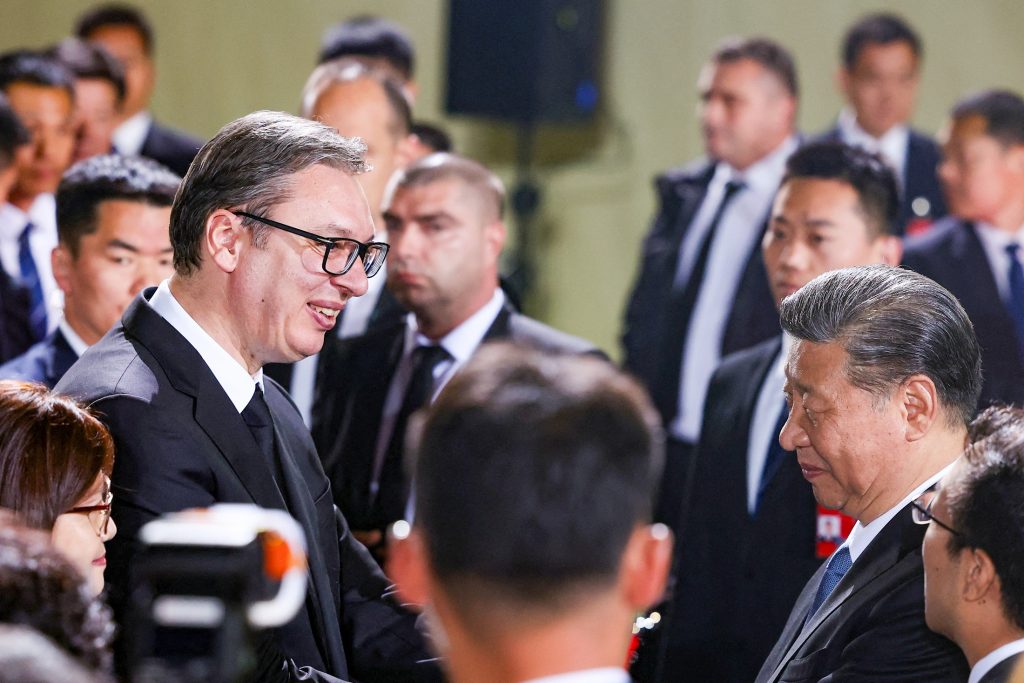
Steel friendship. This is how Chinese President Xi Jinping characterized Sino-Serbian relations. This expression in the Chinese language describes friends who support and trust each other despite challenges and external changes.
China established diplomatic relations with Yugoslavia in 1955, and in 2009 Serbia became the first country in central and eastern Europe with which China raised relations to the level of strategic partnership. It was raised to comprehensive strategic partnership in 2016. China is now Serbia’s second largest trading partner. According to China’s Ministry of Commerce, bilateral trade reached 4.35 billion US dollars in 2023. Last October, China and Serbia signed a free trade agreement, and here Serbia also became the first among the countries of central and eastern Europe.
China is also the largest investor in the Serbian economy. It has been systematically investing in the manufacturing and mining industries for almost 10 years. As one of the first countries to join the “One Belt, One Road” initiative, Serbia is implementing a number of infrastructure projects with China. One of the most important is the construction of a 350-kilometer Belgrade-Budapest high-speed railway line, which is being built by Chinese companies, with the prospect of extending it to the Macedonian capital Skopje and further to the Greek port of Thessaloniki. According to Beijing’s plans, the Thessaloniki-Budapest highway should become one of the key routes for delivering Chinese products to Europe in the future.
In the past 8 years, Chinese companies have invested more than 5.5 billion euros in the Serbian economy. They own some of the most important industrial enterprises in Serbia. Chinese companies hold three strategic enterprises – the steel plant in Smederevo and the large copper and gold mines Bor and Majdanpek in the east of the country. Steel produced at the Smederevo plant is exported to Europe, among others. However, copper and gold ores are exported from Serbian mines to China, processed there and then sold as semi-finished or fabricated products.
In order to bind Serbia more closely to itself, as the former Serbian ambassador to the Republic of Belarus, Srecko Djukic, states, “Beijing has untied a bag of money, and Serbia can take as much money from this Chinese bag as it wants. No other country will give it that. But that money has to be returned. Also, this money, which Serbia takes in the form of loans, is spent on Chinese enterprises. They are given to Chinese companies operating in Serbia, not to Serbian companies”. The state’s foreign debt is 35-36 billion euros, with China accounting for more than 18 billion. And yet, China tops Serbian opinion polls as the most popular foreign country.
It is worth noting that China is an unexpected player in the Balkans. It has no historical experience of presence in the region, unlike the West, Russia and Turkey. China has other advantages – it is a rising superpower, the second largest economy in the world. China has far more material resources to offer Serbia. For Beijing, this cooperation is in its geopolitical interests: The Balkans are a kind of bridge to greater Europe, a gateway to the European Union market. China is clearly attracted by the fact that Serbia is a candidate for the EU, but is not yet a member of the union. It is a country that has all sorts of institutional ties to the European Union, but it is not subject to the same vetting mechanisms as EU member states. So China can use Serbia as a testbed for its products.
For example, introduce the product to the Serbian market, if it enters there, distribute it in neighboring countries in the Balkans – and then already sell it to the EU. In addition, Serbia is useful to China in terms of promoting its brand as a rising superpower. Belgrade gives Beijing an opportunity to show that it is now able to forge partnerships even with smaller European countries. During Xi Jinping’s visit to Belgrade in May, the two sides signed a statement on the “united future” of the two countries. According to the Serbian president, it is a level above the “Comprehensive Strategic Partnership” agreement that the two countries agreed on in 2016.
According to experts, when Xi talks about “a unified future” he makes it clear that he wants a new balance of power in the world. And the fact that Serbia is being talked about as the first European country to be part of the “united future” community shows that for the Chinese leadership, especially for Xi, Serbia is of great importance as an economic partner and as a candidate country for EU membership. In addition, Xi’s visit to Serbia made it clear to Washington that China has reliable partners in Europe and that the U.S. “will not be able to completely pull Europe to its side. Yet, we would venture to assume that raising the level of cooperation between Serbia and China from a strategic partnership to “building a community of Serbia and China with a common future in a new era” is nothing more than a diplomatic game that suits both governments at the moment.
Although 28 agreements were signed during Xi Jinping’s visit to Belgrade, the only area that did not appear in any way in the memoranda was defense. This could only have been influenced by the US. The Serbs seem to have found the perfect formula: cooperate with China on infrastructure and investment, and with the Americans in areas of strategic importance to them, such as 5G and defense products. In the wake of Russia’s full-scale invasion of Ukraine, the relationship with China offers several other advantages. Vladimir Putin has turned into a highly toxic leader during the two and a half years of war, while the Chinese leadership has not. So Vucic prefers to appear in the company of Xi rather than Putin. Beijing may be turning into a strategic adversary of the EU, but that does not imply a break in economic relations. The cost of deepening ties with Beijing will not be prohibitive as long as the EU itself continues to trade with China and invest in its economy. The benefits here are quite obvious for both China and Serbia.
Another cornerstone of Belgrade-Beijing relations is that Serbia is interested in Beijing’s support for its position on Kosovo. China does not recognize Kosovo’s independence and has consistently voted in line with this position in the UN Security Council, something Belgrade counts on in the future. Since Xi Jinping became the Chinese leader, this support within the UN has only increased. For its part, Serbia is firmly committed to the “one China” principle. “The PRC has always been on the side of international law and has always supported us, just as we have always supported China. Taiwan is China, period,” Aleksandar Vucic said in the same CCTV interview.
Special relations with China, defense contacts with the United States and the EU, does this mean that Belgrade has multiplied by zero the relations with Russia, which has long been a reliable support for Serbia.
Zugzwang for Vučić
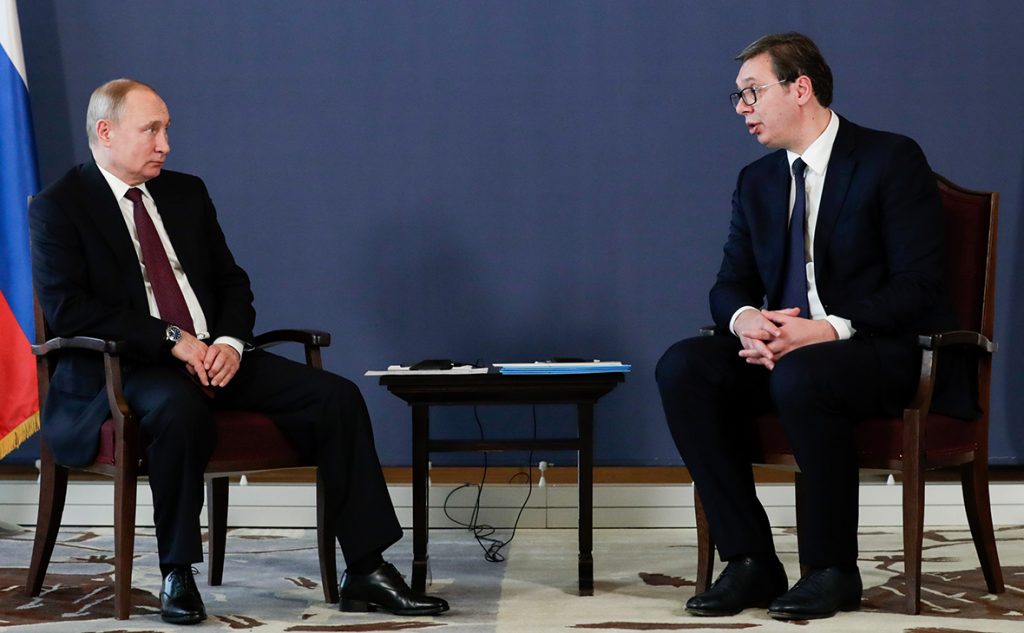
Serbian-Russian relations have always had their ups and downs, which largely depended on the balance of power at a particular historical moment. Russia contributed to the restoration of Serbian statehood during the war with Turkey in 1806-1812 (Serbian lands had been under Ottoman rule for more than 350 years). During World War I, the Russian Empire supported Serbia both politically, economically and militarily. Serbia’s relations with the USSR were not so simple. Thus, the Kingdom of Yugoslavia (1918-1945) recognized the USSR only in 1940 – the last of the Balkan countries. And relations with Joseph Broz Tito were not cloudless.
Today, however, these ties are much more influenced by contemporary circumstances than by the memory of the past. The war in Ukraine has dramatically changed some aspects of Serbia-Russia relations, but there are a number of factors that make it impossible for Belgrade to say, “Goodbye unwashed Russia…”.
First, the unresolved dispute over Kosovo’s status. For Serbia, the position of Russia, a permanent member of the UN Security Council, on the Kosovo issue is extremely important. Second, Moscow is useful for strengthening Belgrade’s position in negotiations with the West. The Serbian government understands that European countries and the United States will not criticize the situation in the country too actively, because they fear that in response Belgrade may lean more towards Moscow. And in this sense, Serbia, as well as Hungary for that matter, is using its relationship with the Kremlin to improve its negotiating position with the EU and the West as a whole.
Third, although Serbia is looking for alternative energy sources, its dependence on Russian gas still remains. To add to this, Gazprom is the majority shareholder of NIS (Naftna Industrija Srbije), the Serbian national energy company. The Serbian contract for gas supply from Russia expires in March 2025, and Serbian Deputy Prime Minister Aleksandar Vulin flew to Vladivostok for the Eastern Economic Forum to discuss the issue with the Russian president. Vladimir Putin noted that Russia plays a significant role in providing Serbia with energy resources. “It does it very correctly, at a high level, in a timely manner, on good, very good conditions for Serbia,” the Russian leader added.
Eventually, with Putin’s support, the contract will be extended. Russian gas is supplied to Serbia through an extension of the Turkish Stream pipeline, which runs through Bulgaria. In 2023, Russia supplied Serbia with 2.68 billion cubic meters of gas. In 2024, according to the director of Srbijagas, Dusan Bajatovic, the deliveries should exceed 3 billion cubic meters. Fourth, there are close ties between the Serbian Orthodox and Russian Orthodox Churches. Finally, the majority of Serbian politicians, if not outright pro-Russian, are friendly toward Russia. These same sentiments are also characteristic of the Serbian population. Almost half of Serbs, 43%, justify Russia’s aggression against Ukraine. Therefore, the Serbian government, like politicians in many other countries, is concerned about Russia’s popularity among the population of their country.
Belgrade fears that the Russian leadership can use this factor to politically destroy the country if it starts pursuing policies that appear anti-Russian to the Kremlin. Therefore, President Vucic is trying to maneuver. Having visited Russia more than 20 times before, meeting with Putin, he is now “shunning” relations with the Kremlin master. He publicly and vehemently denies claims that he has any relations with Putin, assures the West that Serbia is not Moscow’s “Trojan horse” in Europe, and for the first time in eight years “forgot” to wish the Russian leader a happy birthday. Vucic has a specially trained person to communicate with Russia – Deputy Prime Minister Aleksandar Vulin, who himself has become a significant asset for Russia. However, it is still unclear to what extent Vulin coordinates his actions with Vucic and whether this is not a game of “good cop” and “bad cop” by the Serbian authorities.
Today, it is Vulin who has become the power thread that connects Belgrade and Moscow. He voices pro-Russian narratives, saying that Serbia’s accession to BRICS is more beneficial for the country than joining the EU. According to him, the EU imposes conditions on Serbia that it cannot fulfill and does not perceive the country as a partner. At the same time, Vladimir Putin has never set conditions that if Serbia joins the EU, Russia will break relations with it. Brussels, on the other hand, requires Belgrade to sever ties with Moscow in order for Serbia to join the EU. In addition, Vulin tirelessly emphasizes that Russia is a strategic partner and ally of Moscow and assures Putin that Serbia will never join NATO. In short, Vulin voices what is pleasing to the Kremlin’s ears, unlike Serbian President Vucic.
However, the Serbian president also has something that is very much appreciated in the Kremlin. His position on anti-Russian sanctions. Belgrade, through Vucic’s mouth, publicly states that it will not join the sanctions against Russia. And Moscow cannot but appreciate this position, which for Moscow shows that not all European governments fully support the Euro-Atlantic mainstream. True, at the same time, Vucic very theatrically states that because of this position he is under severe pressure from the West. However, we hear this talk not from Western officials and politicians, but from Vucic himself. In reality, Serbia is already fulfilling part of the Western sanctions without formally joining them. Therefore, all the talk about severe pressure is a game designed to prepare society for the fact that sooner or later anti-Russian sanctions in one form or another will have to be imposed. Moreover, it is also preparing the Russian leadership for this, trying to demonstrate that it is resisting in every possible way – and this should be appreciated.
Otherwise, Vucic’s actions show that Serbia’s path lies to the West. On November 1, 2022, Serbia stopped buying oil from Russia as part of the energy embargo against Russia. Previously, it was delivered by tankers on the Adriatic Sea and then by oil pipeline through Croatia. Russian defense industry has also left the Serbian market. Earlier, the Serbian president had already pointed out that Western countries did not allow Belgrade to buy weapons from Russia, and that the country could not receive the electronic warfare systems “Krasukha” and “Repellent” already ordered in Russia.

Now Belgrade itself is also selling arms to Ukraine through third countries. According to the Financial Times, the volume of military exports from Serbia to Ukraine via third countries amounts to about 800 million euros. As experts note, the Serbian “defense industry” is not particularly choosy in choosing clients and is usually interested only in profit. However, in this case it could have been a calculated move coordinated with Washington, with whom Belgrade has strengthened security cooperation over the past two years. Most likely, the deal was made through Turkey and the Czech Republic, primarily based on domestic political interests, so as not to anger the Russophile part of the Serbian population. And not to irritate the Kremlin too much.
In addition, Vucic received good bonuses. For example, the states behaved very restrained during the anti-government demonstrations last year. Vucic, justified that these were purely commercial deals because Serbia has no control over who the munitions are ultimately delivered to. But both Serbian law and international standards require that you know who is the end user of defense products. So the fact that the weapons would end up in Ukraine certainly did not escape the attention of the Serbian government.
Because of the war in Ukraine, Serbia’s price for Russia has risen slightly. Through its relations with Belgrade, Moscow shows that it has not been kicked out of the Balkans completely and that there are still countries in Europe that are willing to deal with Russia. The Serbian government is helping the Kremlin save face. That is why it does not pay too much attention to such agreements, as well as to other gestures unfriendly to Russia. At the beginning of April 2024, it became known that Serbia provided Ukraine with financial aid for 1 billion hryvnias. In addition, Serbia condemned Russia’s aggression against Ukraine at the UN in the spring of 2022, and on October 9, 2024, at the Ukraine-Southeast Europe summit in the Croatian city of Dubrovnik, Aleksandar Vucic signed an anti-Russian de-claration condemning the Kremlin for the war unleashed in Ukraine.
The declaration also proclaims an “unwavering commitment to restore Ukraine’s sovereignty and territorial integrity” by providing it with “comprehensive assistance”. The signatories call on other countries not to support Russia’s military efforts. The declaration names the withdrawal of Russian troops from Ukraine, cessation of hostilities and “restoration of Ukraine’s full control over its state borders,” including Crimea, Sevastopol, Donbass, Kherson and Zaporizhzhya regions, as conditions for restoring peace that are “non-negotiable.” This is the third anti-Russian declaration in the Ukraine-Southeast Europe format signed by Serbia. The first was signed at the platform summit in Athens on August 21, 2023, the second – in Tirana on February 28, 2024.
Russia is also not happy about official Belgrade’s cooperation with NATO, which is continuously deepening and the Serbian authorities’ obligations to the bloc are growing. At the same time, we are talking not only about obligations in the sphere of military cooperation, but also about obligations of a political nature. That is why a number of Serbian independent experts say that Serbia and NATO have reached the highest level of cooperation possible between the alliance and a non-member country. The balance in military cooperation with NATO and Russia until 2020 was maintained by Serbia through periodic military exercises with one side or the other. For example, the Serbian military has participated in the Russian-Serbian-Belarusian exercise “Slavic Brotherhood” since 2015. But in 2020, Belgrade abandoned this format, citing pressure from the European Union. Serbia first suspended participation in all international military exercises, and then resumed it with NATO countries. However, given the generally anti-NATO sentiments of the Serbian population, it is premature to talk about Belgrade’s possible accession to the alliance.
Serbian President Aleksandar Vucic faced another geopolitical choice after he was invited by Vladimir Putin to the BRICS summit in Kazan.
The Russian president publicly extended this invitation to Serbian Deputy Prime Minister Aleksandar Vulin during their recent meeting in Vladivostok. “We are expecting President Vucic at the BRICS events in Kazan. We have sent an invitation, I hope he will accept it,” the Russian president announced. Speaking to Serbian journalists, Aleksandar Vucic confirmed that he “…received an invitation from the Russian president”, thanked for it, but made it clear that he could not accept the invitation yet. “We have important guests from abroad at this time, as they say, it will be tense on the patch in front of the gate,” the Serbian leader figuratively put it, mentioning also his upcoming trip to New York for the UN General Assembly session and planned meetings with “six presidents and seven or eight prime ministers,” as well as the celebration of the 80th anniversary of the liberation of Belgrade on October 20. He then said he “had to rush to a telephone conversation with German Chancellor Olaf Scholz.”
Aleksandar Vucic’s cool reaction to the Russian president’s invitation came as a surprise to many in Serbia and the region. After all, a year ago, a group of Serbian parliamentary deputies submitted a draft resolution on Serbia’s accession to BRICS. A few months ago, the Serbian president himself announced in his regular address to the nation that “he will be invited to the BRICS summit. Finally, recently, Aleksandar Vucic admitted that “he has not spoken to Russian President Vladimir Putin for two and a half years”. The Kazan summit, one of the topics of which will be the status of the BRICS partners, provided the Serbian leader with such an opportunity. Nevertheless, he is clearly in no hurry to take advantage of it.
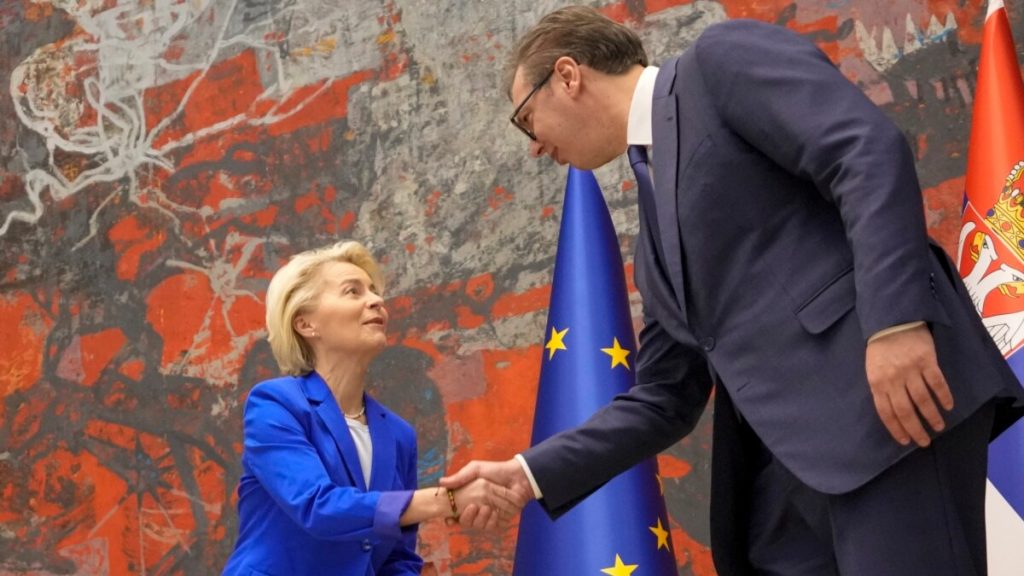
Bearing in mind that the European Union and the United States regard rapprochement with Russia as incompatible with Serbia’s declared plans for European integration and its foreign policy priorities, Vucic began to “squirm” while sitting on two “foreign policy chairs”. Especially since the steps taken by Belgrade towards the West, which we have already mentioned (the agreement with the EU on lithium mining, the purchase of 12 French Rafale fighter jets, the supply of Serbian arms to Ukraine through third countries for €800 million) caused discontent in Moscow, which, although it did not make a fuss about it, would like to see concrete evidence of Belgrade’s readiness for allied relations with Russia.
Vucic found himself in an extremely unpleasant situation, stretching himself in a geo-political twine. It seems that his sitting on several chairs is coming to an end, and Kazan may become a “boiling cauldron” for him. According to Serbian media, after Aleksandar Vucic announced that he could not accept the Russian president’s invitation, he was urgently sought out by the Russian ambassador to Serbia. According to local media, the ambassador tried to explain to him “on his fingers” the consequences of not accepting Vladimir Putin’s invitation and reminded him that in March 2025, Serbia’s agreement with Russia on gas supplies at a price several times lower than that for Europe expires.
After communicating with the ambassador, Aleksandar Vucic slightly adjusted his position. “Some say that I rejected the invitation, some say that I accepted it. Both are lying. I will make a decision on October 10 or 15. I don’t want to reject or accept invitations,” he announced. However, both October 10 and October 15 have passed, and President Vucic is still silent. It is difficult to predict how Vucic will end up with the invitation to the BRICS summit. But it is obvious that Vucic, as an experienced geopolitical grandmaster, will try to play another combination, for example, by publicly declaring that he accepts the invitation, but the day before the summit he falls ill or, God forbid, some cataclysmic events occur in Serbia. Biden did not go to the Ramstein meeting because of Hurricane Milton.
However, in any case, Vucic finds himself in a classic zugzwang. In chess language – a situation in which the obligation to make a move only worsens the situation. Therefore, Vucic is faced with a choice, and what will be its consequences, the near future will show….

